CRACKDOWN IN THE TROPICS
I am writing this as desert winds storm around my new seaside home in Dakar, Senegal. This reminds me I have left my previous post in lush, tropical, never dull, Abidjan, Ivory Coast.
I stayed there three years.
In remembrance, I will write about my most frightening day, on March 25th, 2004.
***
A Day in the Red Zone
***
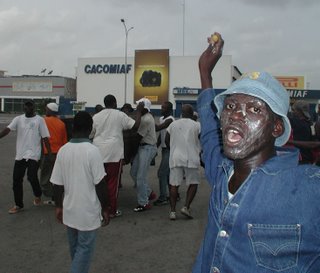
Abidjan, with its decaying facades of former French colonies, cocoa-funded, pothole dodging Mercedes-Benzes, destitute youth with nothing much to do but show off, is under siege.
Tropical Stalinism. The head of the army who will later be seen as a coward, put on an African boubou (traditional dress), and disappear in the bush village, as impenetrable to an outsider as an Afghan cave, says a line is drawn around downtown and anyone who dares cross into this “red zone” will be shot.
As I drive through wide avenues in the already hot and furiously humid early morning, the usual movement is gone. Young, muscular men, stripped of their shirts, are rounded up, sitting in shadows, silent.
Some of them are forced to do push-ups. Despite the activity, there is a hush. As I gape from a main intersection, and the light turns green, there are no other cars anyway, so I gape some more, their muscles lean, while the khakis, or “corps habilles” (uniformed bodies) as they are called, look over them, grimacing, AKs at the ready. “On va les deshabiller”, (we will undress them), was a popular song.
Northern rebels, if they are made to undress, under the sun, the lyrics said, will be finished. A popular dance move in the south was to fake stripping, in show of defiance of the powers that be.
However many AK-47s were stuffed in your face at roadblocks by drunken soldiers, it was always sarcastic humor that was the best approach.
Back to the morning of March 25th and the half stripped men.
Their crime, so far, being out in the streets on the day the opposition in Abidjan wants to march for peace. They must have not heard about the “red zone.”
***
A failed constitutional coup
***
A peace deal signed in 2003 between President Laurent Gbagbo and rebels who control the semi-arid land of the north, following a drum-beat insurgency that failed to break the cocoa corridor, is not being implemented. To this day, it still isn’t.
The accord is as the president’s party says a constitutional coup, making Ivory Coast a country of cocoa dividends not just for southerners, but forcing them to share rights and rewards with many northerners now considered immigrants, many of them descendants of laborers and traders from what is now Guinea, Mali, Niger and Burkina Faso.

These descendants were previously given voting cards during the benevolent post-independent dictator’s rule, “betail electoral”, “electoral cattle”, scorned the pro-democracy activists of the day, now in power.
“Bitter medicine” is what President Gbagbo calls the peace deal. Since his army was weak and he needed mercenaries to fight back, Mr. Gbagbo, a southerner from the small Bete ethnic group, had no choice but to accept, at least in diplomatic halls, the power-sharing deal.
In practice, in brutal, primitive Cote d Ivoire, it has allowed him to stay in power, beyond his semi-elected mandate. While pretending to swallow successive refills to appease the international community, he has spit back everything.
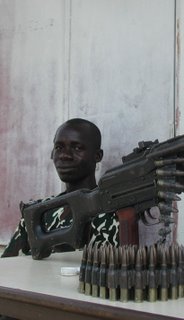
None of the sweeping constitutional changes to redefine nationality and broaden voting rights are taking effect. None of the power has been shared. The rebels remain defiant and armed, while Mr. Gbagbo has retooled his security apparatus and revised his strategies, perfecting the art of ruling through middling paranoia and occasional chaos.
His aim is to prevent implementation of the deal, unless of course, he is given time to finagle it to his advantage. He is a perverted historian who has a view warped by supremacist ideals of his own ethnic group, coupled with a populist double loathing and jealousy of the former colonial power France.
The rebels say the peace deal should define Mr. Gbagbo’s power rather than the opposite, because his post-coup electoral victory in 2000 came against the brief military ruler, while the two main opposition candidates were barred from running – one the toppled president, on corruption charges, the other, the former prime minister, because of doubts over his nationality.
***
MILITANT MARTYRS
***
As I sense unusually high tension, I place a sign on my car saying American press.
It’s always good to be identified as something here. Both rebels and the government like what they call the American can-do attitude. For whatever it’s worth, in Abidjan, this is not a bad day to be an American.
Israeli Mossad agents occupy the top floor of the Hotel Ivoire.
President Gbagbo has prepared an Israeli-type operation to crush second-class citizens, armed with just rocks and their rusty cars they will use as barricades, some palm wine, maybe a few C-F-A francs, a pittance paid by opposition parties.
Their leaders who organized the march, who promised to brave the red zone and lead the popular charge, answer their cell phones, asking for information rather than providing any. “Me out there? Are you crazy, I will be killed.”
The morning news that plays over the car radio states again that anyone who approaches the red zone, a wide area around the presidential palace, will be considered an “enemy combatant.”
The opposition was planning to meet at Place de la Republique, smack dab in the middle of the red zone. Many journalists took up residence at a downtown hotel the night before, and ended up stuck.
I park the car and decide to walk toward the forbidden area. Big mistake. I am wearing a white tee shirt, the sign of the pro-peace movement. My cell phone rings, I answer. Third mistake.
Suddenly, I think of Jean Helene, the French journalist who was killed the year before outside police headquarters. I remember talking with him to the rebel leader and then he was dead.
He was awaiting the release of opposition activists at night. His killer, a policeman, said he was holding a phone to his ear and not talking. Enough to get killed.
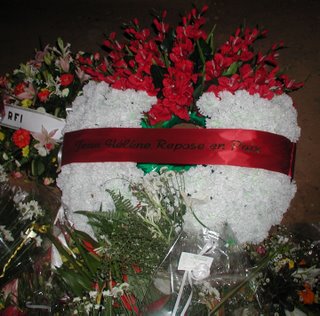
Explaining Mr. Helene’s death to foreign journalists, Mr. Gbagbo, sitting with a flowery shirt and expanding stomach, said he had just received a case of wine from the French eastern city of Mulhouse, Mr. Helene’s hometown. He said it was the wine he was currently drinking, and then laughed like the devil.
***
PSYCHO RECRUITS
***
Two the recently recruited presidential guards, young men wearing fatigues and red berets, run towards me, a little heavy footed, but since they are armed, I raise my hands, ready to accept their initial offering.
I am frozen but also thinking fast.
They slap me in the face a few times, I do not flinch. Big words follow. You like exploiting our misery don’t you? Good point, I think to myself.
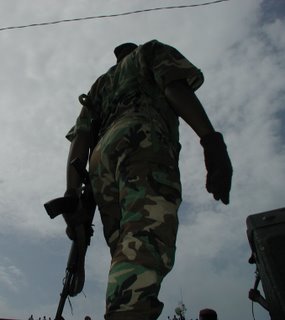
They tear off my camera, wringing my neck, kick me in the shins, and punch me once, a bit harder, in the mouth.
My Ivorian assistant is treated much worse. He is tripped and kicked in the mouth on the ground. He also starts to bleed.
I protest that this is silly, “c’est debile,”, they stop, and ask us to sit down. All our equipment is taken away from us, along with our assorted accreditations, fake ones and real ones, as we await our fate, shaking internally.
I look over, young men, again without their shirts off, are sitting in the shadow of a tank. Another Ivorian journalist, among them, visibly trembling, is trying to get to work for the government-run newspaper. He is told it’s best to return home.
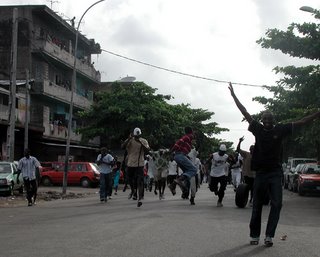
I am told to go back from where I came from, wherever that was. So I drive away from the red zone through main streets of opposition neighborhoods, Treichville, Marcory, Williamsville, as the crackdown is about to begin.
“Gbagbo, dictator!” “It’s over for him!”, “the Baker has rolled his last dough.” Out roll the tires, down come the old wooden desks, and whatever else, up go the barricades.
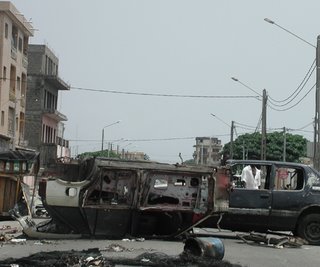
Soon open four by fours full of soldiers drive by, tossing tear gas canisters into the gathering crowds, firing into the air. Helicopters hover close to the ground.
We turn into a street, a soldier fires into the back of a protester running away. I u-turn without looking at the result of his actions. It all happens in a blink of an eye. I can tell tear gas has turned to bullets and that the protest will be stuffed and aborted and that dead bodies will fill the streets.
It’s time for me to file my first story of the day in my studio in a relatively plush area of Abidjan, where ministers and missionaries are my neighbors, where the streets are also under siege, but since no one is marching, indiscriminate firing is not needed.
Still the advice the military give is firm. An old maid who says she is looking for bread for her “patron” is told, she should best wait, and get off the streets. I feel that I have been followed.
I am not a photographer, I am not a war reporter, I am not a cameraman. There is no need for me to walk over a freshly killed body.
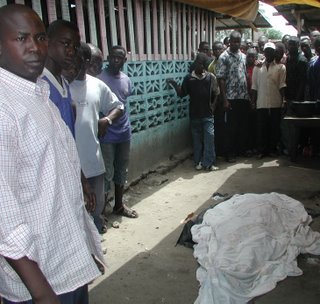
Later in the afternoon, I see some of these, their bodies sometimes covered by white sheets but attracting crowds, and victims with bullet wounds. Every interview I start, there is panic as a helicopter hovers, a military jeep turns a corner or a soldier by foot approaches, sending me scurrying away.

The opposition protesters never made it out onto the main streets. Military raids continued for several days, especially at night into the homes of immigrant–dominated neighborhoods.
The opposition says up to 500 people were killed. President Gbagbo said the march was a renewed attempt to overthrow him, and that some of the protesters were armed.
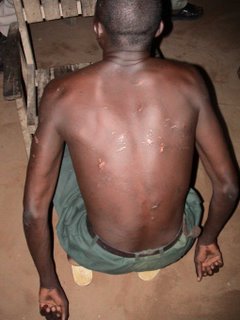
The next few days are filled with gruesome testimonies collected in hidden spots: some who ran away say they saw lethal injections and rapes for the injured and detained in military hospitals, they saw others who were shot point blank in the head on the way to police stations, they recount beatings with bike chains and bricks in courtyards.
***
RUMORS OF GRAVES
***
Rumors of mass graves in landfills go unverified. The opposition says the bodies were taken elsewhere when the allegations surfaced. Several days later, even though the movement of the city has already started again timidly, I drive myself in the direction of the forest where the mass grave is rumored to be.
This day having American Press on my car may not have been such a good idea. After being stopped at a military roadblock and then noticing a helicopter overhead, I am suddenly surrounded by two trucks full of soldiers. I am asked to immediately get out of the car, and not move an inch. I cross my arms and look into the sky, thinking that whatever happens, the sun is still my ally. Soldiers speak with my Ivorian assistant for half an hour. They tell him we have no right to go further.
The next day, the interior minister, whose niece would later be the girlfriend of another foreign journalist, walks, pipe in mouth, across the supposed grave site, with bulldozers churning out the earth, filmed by state television, to prove he says, there was no mass grave.
A journalist who is being sued by Mr. Gbagbo for writing a headline that said “The Death Squads of Mr. Gbagbo” tells another journalist he heard there were orders to shoot down a white car with American press on the dashboard heading toward the alleged mass grave. Luckily, it turned out to be an unfounded rumor, or at least, another one I did not get to experience firsthand.
I stayed there three years.
In remembrance, I will write about my most frightening day, on March 25th, 2004.
***
A Day in the Red Zone
***

Abidjan, with its decaying facades of former French colonies, cocoa-funded, pothole dodging Mercedes-Benzes, destitute youth with nothing much to do but show off, is under siege.
Tropical Stalinism. The head of the army who will later be seen as a coward, put on an African boubou (traditional dress), and disappear in the bush village, as impenetrable to an outsider as an Afghan cave, says a line is drawn around downtown and anyone who dares cross into this “red zone” will be shot.
As I drive through wide avenues in the already hot and furiously humid early morning, the usual movement is gone. Young, muscular men, stripped of their shirts, are rounded up, sitting in shadows, silent.
Some of them are forced to do push-ups. Despite the activity, there is a hush. As I gape from a main intersection, and the light turns green, there are no other cars anyway, so I gape some more, their muscles lean, while the khakis, or “corps habilles” (uniformed bodies) as they are called, look over them, grimacing, AKs at the ready. “On va les deshabiller”, (we will undress them), was a popular song.
Northern rebels, if they are made to undress, under the sun, the lyrics said, will be finished. A popular dance move in the south was to fake stripping, in show of defiance of the powers that be.
However many AK-47s were stuffed in your face at roadblocks by drunken soldiers, it was always sarcastic humor that was the best approach.
Back to the morning of March 25th and the half stripped men.
Their crime, so far, being out in the streets on the day the opposition in Abidjan wants to march for peace. They must have not heard about the “red zone.”
***
A failed constitutional coup
***
A peace deal signed in 2003 between President Laurent Gbagbo and rebels who control the semi-arid land of the north, following a drum-beat insurgency that failed to break the cocoa corridor, is not being implemented. To this day, it still isn’t.
The accord is as the president’s party says a constitutional coup, making Ivory Coast a country of cocoa dividends not just for southerners, but forcing them to share rights and rewards with many northerners now considered immigrants, many of them descendants of laborers and traders from what is now Guinea, Mali, Niger and Burkina Faso.

These descendants were previously given voting cards during the benevolent post-independent dictator’s rule, “betail electoral”, “electoral cattle”, scorned the pro-democracy activists of the day, now in power.
“Bitter medicine” is what President Gbagbo calls the peace deal. Since his army was weak and he needed mercenaries to fight back, Mr. Gbagbo, a southerner from the small Bete ethnic group, had no choice but to accept, at least in diplomatic halls, the power-sharing deal.
In practice, in brutal, primitive Cote d Ivoire, it has allowed him to stay in power, beyond his semi-elected mandate. While pretending to swallow successive refills to appease the international community, he has spit back everything.

None of the sweeping constitutional changes to redefine nationality and broaden voting rights are taking effect. None of the power has been shared. The rebels remain defiant and armed, while Mr. Gbagbo has retooled his security apparatus and revised his strategies, perfecting the art of ruling through middling paranoia and occasional chaos.
His aim is to prevent implementation of the deal, unless of course, he is given time to finagle it to his advantage. He is a perverted historian who has a view warped by supremacist ideals of his own ethnic group, coupled with a populist double loathing and jealousy of the former colonial power France.
The rebels say the peace deal should define Mr. Gbagbo’s power rather than the opposite, because his post-coup electoral victory in 2000 came against the brief military ruler, while the two main opposition candidates were barred from running – one the toppled president, on corruption charges, the other, the former prime minister, because of doubts over his nationality.
***
MILITANT MARTYRS
***
As I sense unusually high tension, I place a sign on my car saying American press.
It’s always good to be identified as something here. Both rebels and the government like what they call the American can-do attitude. For whatever it’s worth, in Abidjan, this is not a bad day to be an American.
Israeli Mossad agents occupy the top floor of the Hotel Ivoire.
President Gbagbo has prepared an Israeli-type operation to crush second-class citizens, armed with just rocks and their rusty cars they will use as barricades, some palm wine, maybe a few C-F-A francs, a pittance paid by opposition parties.
Their leaders who organized the march, who promised to brave the red zone and lead the popular charge, answer their cell phones, asking for information rather than providing any. “Me out there? Are you crazy, I will be killed.”
The morning news that plays over the car radio states again that anyone who approaches the red zone, a wide area around the presidential palace, will be considered an “enemy combatant.”
The opposition was planning to meet at Place de la Republique, smack dab in the middle of the red zone. Many journalists took up residence at a downtown hotel the night before, and ended up stuck.
I park the car and decide to walk toward the forbidden area. Big mistake. I am wearing a white tee shirt, the sign of the pro-peace movement. My cell phone rings, I answer. Third mistake.
Suddenly, I think of Jean Helene, the French journalist who was killed the year before outside police headquarters. I remember talking with him to the rebel leader and then he was dead.
He was awaiting the release of opposition activists at night. His killer, a policeman, said he was holding a phone to his ear and not talking. Enough to get killed.

Explaining Mr. Helene’s death to foreign journalists, Mr. Gbagbo, sitting with a flowery shirt and expanding stomach, said he had just received a case of wine from the French eastern city of Mulhouse, Mr. Helene’s hometown. He said it was the wine he was currently drinking, and then laughed like the devil.
***
PSYCHO RECRUITS
***
Two the recently recruited presidential guards, young men wearing fatigues and red berets, run towards me, a little heavy footed, but since they are armed, I raise my hands, ready to accept their initial offering.
I am frozen but also thinking fast.
They slap me in the face a few times, I do not flinch. Big words follow. You like exploiting our misery don’t you? Good point, I think to myself.

They tear off my camera, wringing my neck, kick me in the shins, and punch me once, a bit harder, in the mouth.
My Ivorian assistant is treated much worse. He is tripped and kicked in the mouth on the ground. He also starts to bleed.
I protest that this is silly, “c’est debile,”, they stop, and ask us to sit down. All our equipment is taken away from us, along with our assorted accreditations, fake ones and real ones, as we await our fate, shaking internally.
I look over, young men, again without their shirts off, are sitting in the shadow of a tank. Another Ivorian journalist, among them, visibly trembling, is trying to get to work for the government-run newspaper. He is told it’s best to return home.

I am told to go back from where I came from, wherever that was. So I drive away from the red zone through main streets of opposition neighborhoods, Treichville, Marcory, Williamsville, as the crackdown is about to begin.
“Gbagbo, dictator!” “It’s over for him!”, “the Baker has rolled his last dough.” Out roll the tires, down come the old wooden desks, and whatever else, up go the barricades.

Soon open four by fours full of soldiers drive by, tossing tear gas canisters into the gathering crowds, firing into the air. Helicopters hover close to the ground.
We turn into a street, a soldier fires into the back of a protester running away. I u-turn without looking at the result of his actions. It all happens in a blink of an eye. I can tell tear gas has turned to bullets and that the protest will be stuffed and aborted and that dead bodies will fill the streets.
It’s time for me to file my first story of the day in my studio in a relatively plush area of Abidjan, where ministers and missionaries are my neighbors, where the streets are also under siege, but since no one is marching, indiscriminate firing is not needed.
Still the advice the military give is firm. An old maid who says she is looking for bread for her “patron” is told, she should best wait, and get off the streets. I feel that I have been followed.
I am not a photographer, I am not a war reporter, I am not a cameraman. There is no need for me to walk over a freshly killed body.

Later in the afternoon, I see some of these, their bodies sometimes covered by white sheets but attracting crowds, and victims with bullet wounds. Every interview I start, there is panic as a helicopter hovers, a military jeep turns a corner or a soldier by foot approaches, sending me scurrying away.

The opposition protesters never made it out onto the main streets. Military raids continued for several days, especially at night into the homes of immigrant–dominated neighborhoods.
The opposition says up to 500 people were killed. President Gbagbo said the march was a renewed attempt to overthrow him, and that some of the protesters were armed.

The next few days are filled with gruesome testimonies collected in hidden spots: some who ran away say they saw lethal injections and rapes for the injured and detained in military hospitals, they saw others who were shot point blank in the head on the way to police stations, they recount beatings with bike chains and bricks in courtyards.
***
RUMORS OF GRAVES
***
Rumors of mass graves in landfills go unverified. The opposition says the bodies were taken elsewhere when the allegations surfaced. Several days later, even though the movement of the city has already started again timidly, I drive myself in the direction of the forest where the mass grave is rumored to be.
This day having American Press on my car may not have been such a good idea. After being stopped at a military roadblock and then noticing a helicopter overhead, I am suddenly surrounded by two trucks full of soldiers. I am asked to immediately get out of the car, and not move an inch. I cross my arms and look into the sky, thinking that whatever happens, the sun is still my ally. Soldiers speak with my Ivorian assistant for half an hour. They tell him we have no right to go further.
The next day, the interior minister, whose niece would later be the girlfriend of another foreign journalist, walks, pipe in mouth, across the supposed grave site, with bulldozers churning out the earth, filmed by state television, to prove he says, there was no mass grave.
A journalist who is being sued by Mr. Gbagbo for writing a headline that said “The Death Squads of Mr. Gbagbo” tells another journalist he heard there were orders to shoot down a white car with American press on the dashboard heading toward the alleged mass grave. Luckily, it turned out to be an unfounded rumor, or at least, another one I did not get to experience firsthand.

Comments
Post a Comment